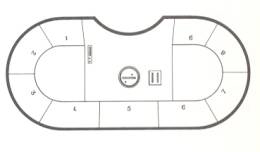Pokerwiner.com → Gambling lessons
Appendix 1 Glossary of gambling terms
Accumulator: In British types horse racing, a cumulative bet. The bettor designates a horse in each of several races and bets on the first one; if he wins, his winnings become his bet on the next; and so on.
A cheval: a roulette bet on two numbers adjacent on the layout.
Across the board: An American racing bet on a horse’s finishing either first, second or third.
Active player: In baccarat, a player who represents a combined group of players in play against the bank.
Any raffle: In hazard, a player’s bet that with three dice he will throw any three of a specific number.
Ante: A online poker bet, placed by the first player before cards are dealt.
Backgammon: A “triple win” in the game of the same name.
Banco: A baccarat player’s call, announcing that he will bet against the bank.
Banco suivi: A baccarat player’s call, announcing that he will bet against the bank.
Bank: The operators of a game (like faro, roulette, or baccarat) in which the players gamble against the operator rather than among themselves. Also, the money reserves held and used by the operators.
Bingo: Winner’s cry in the game of the same name.
Blackjack : The combination of an ace and a card that counts 10-a winning hand in the game of the same name.
Blind bet: A bet made by a race-track book-maker to draw other bookmaker’s attention away from his sizeable betting on another horse-and thus to avoid a shortening of the odds on the other horse.
Bluff: To bet heavily in poker while holding a weak hand-in order to frighten the other players into folding.
Bookmaker (or bookie): A person who accepts bets from the public, usually on racing or sports events.
Bust: Term sometimes used for a player’s exceeding a count of 21 in blackjack.
Call (or see): To end betting on a hand of poker by covering the last player’s bet without raising it.
Caller: The operator of a bingo game, who draws the numbers and calls them out.
Carpet joint: An American slang term for a luxury gambling casino.
Carré (or square): A roulette bet on four numbers forming a square on the layout.
Chance: In hazard, a number thrown instead of the main. To win, the thrower must repeat it before throwing the main.
Chunk number: In hazard, a bet on the numbers one to six.
Cognotte: In baccarat, a slot in the table reserved for the bank’s winnings: also, in chemin-de-fer, a slot in the table reserved for the bank’s cut from the winnings on each coup.
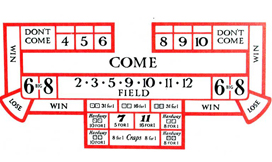
Colonne (or column): A roulette bet on a complete line of 12 numbers running the length of the layout.
Come bet: In craps, a bet that the dice will win on the come-out.
Come-out: In craps, the thrower’s first throw of the dice.
Come-out bet: In craps, a bet that a specified number will be made by the thrower on his come-out.
Coup: Term used in European casinos for a complete round of play in such games as baccarat or roulette.
Crap: A losing throw in craps –either a Two, Three, or Twelve made on the first throw, or a Seven thrown when trying for a point.
Croupier: A casino employee who operates a roulette game .
Daily double: In American horse racing, a combination bet on two horses in two races. If the bettor wins on the first race, his winnings become his stake on the second.
Doubling-up: The basis of some widely used systems. After a loss the player doubles the size of his previous bet hoping to win back the money lost and make a profit.
Douzaine (or dozen): A roulette bet on the numbers 1-12, or 13-24, or 25-36.
Draw: One of the two basic forms of poker. A player is dealt five cards and can discard up to four and draw replacements.
Each way: A racing bet on a horse’s finishing first or second.
En plein (or straight): A roulette bet on an individual number.
Even chances: Equality between the un-favorable and favorable chances. In tossing a coin each side has an even chance of coming up in one toss.
Fade: To accept a bet in craps.
Faites vos jeux : A European croupier’s call to players to place their bets.
Favorable percentage: The amount by which the chances of winning a bet are mathematically better than even.
Favorite: The horse generally considered most likely to win a race.
Fix: To influence the result of a game or sports event (e.g., by bribing players) in order to win a bet.
Floating game: An illegal craps game that is moved from place to place to avoid police.
Flush: In poker, any five cards of one suit.
Fold: In poker, any five cards of one suit.
Fold: In poker, to drop out of the betting on a particular hand.
Forecast: In British racing, a combination bet in which the bettor predicts the horses that will finish first and second.
Four of kind: Four cards of the same numerical value.
Full house: In poker, a hand containing three cards of one value and two of another.
Gammon: A “double win” in backgammon.
Gin: A hand in gin rummy, in which all 10 cards are melded, with no leftovers.
Go down: In gin rummy, when a player ends the play by showing his hand.
Handicap: Term for a horse race in which the horses carry different weights, assigned by racing officials, to even out the chances of winning.
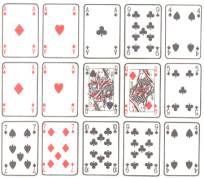
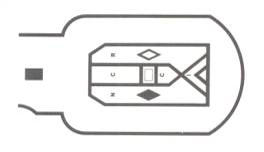
High: In hazard, a player’s bet that with three dice he will throw a total of 11 or more.
Hit: a blackjack term for the player’s drawing another card after the deal. Also, a single win in backgammon.
Hole card: In stud poker, the first card dealt (face down) to a player.
Hot: A craps term for a thrower (or the dice) during a winning streak.
House: A casino or gambling center; also the operators of a gambling game.
House advantage (or edge): A gambling house’s means of ensuring a profit-usually by paying winners at less than the mathematically correct odds.
Impair: A roulette bet that the winning number will be odd.
In the money: Term used to describe the horses that finish first, second, and third (and sometimes fourth) in a race –the horses on which money will be paid to bettors.
Itemer: A cardsharp’s accomplice, who watches the game and signals the nature of the other hands to his partner.
Jackpot: The largest payout that can be won on a slot machine.
Kip: In two-up, the flat stick on which two coins are placed to be tossed.
Last turn: In faro, the last three remaining undealt cards.
Lay-off bet (or hedging): A bet made by a cautious bookmaker on a horse on which he has accepted large bets – in order to cut his losses if the horse wins.
Layout: In games like roulette or bank craps, a diagram (often on cloth ) with spaces indicated for different bets.
Loaded dice: Dice containing some kind of weight that will cause certain sides to come up regularly.
Long odds: In racing, odds (such as 100 to 1) offered against a horse unlikely to win.
Long shot: A horse against which long odds have been offered.
Low: In hazard, a player’s bet that with three dice he will throw a total count of 10 or under.
Main: In hazard, a number that the thrower chooses to try to make on his first throw.
Manqué: A roulette bet on numbers from one to 18.
Martingale : The name of a “doubling-up” system mostly used in roulette.
Meld: In rummy games, three or four cards of consecutive value and the same suit, or a set of three or four cards of the same value.
Miss-out: A craps term for a Two, Three, or Twelve made on the first throw.
Morning line: A statement (usually issued by officials in the morning before a day’s racing) of approximate odds likely to be offered for horses running that day.
Natural : In craps, a Seven or Eleven made on the first throw.
Nick: In hazard the successful throwing of the main.
Noir: a roulette bet that the winning number will be black.
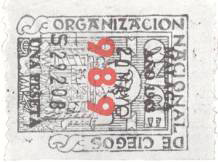
No-throw: In two-up, a throw of one head and one tail.
Numbers bet: In hazard, a bet in which the player tries to forecast the total count of the three dice.
Odds: A statement of comparison between unfavorable and favorable chances. E.g., in throwing a six-sided die the odds against a specified side’s coming up are 5 to 1.
Odds on: Odds offered for a horse that is almost sure to win. At odds of 100 to 1 on a winning et of $100 would bring in $101.
One-armed bandit: A slot machine.
Pair: In poker, two cards of the same value. Also, a roulette bet on an even number.
Pari-mutuel: A means of gambling on races in which all bets are pooled and winners are paid according to the size of the pool and the number of other winners.
Parlay: The American term for an accumulator bet in horse racing.
Pass: A craps term a seven or Eleven made on the first throw, or for the successful making of a point.
Passé: A roulette bet on numbers 19 to 36.
Pitch: A British on-course bookmaker’s betting stand.
Place A: A racing term for a horse’s finishing in second place.
Place bet: In craps, a bet on the result of a throw when the thrower is trying for a point.
Point: In craps, any of the number Four, Five, Six , Eight, Nine, and Ten –which, when thrown on the first throw, must be repeated before throwing a Seven.
Pot: In poker, the total sum of money bet on a hand.
Pulling: Term for a jockey’s holding his horse back to prevent it from finishing among the winners.
Quiniela (or quinella): In American racing, a bet in which the bettor pre4dicts the horses that will finish first and second.
Raffles: In hazard, a player’s bet that with three dice he will throw three of a specific number.
Raise: In poker, to bet a larger sum than any other player’s previous bet.
Reel timing : Cheating the slot machines by timing the spin of the reels and setting them in motion in a way that will make them come to rest in desired positions.
Rien ne va plus: A roulette croupier’s call that ends betting on one spin of the wheel.
Ringer: A horse (or greyhound) entered in a race under another’s name –usually a good runner replacing a poorer one.
Rouge: A roulette bet on a red number.
Royal flush: The highest poker hand –ace, king, queen, jack, 10 of one suit.
Runner: In racing, bookmaker’s employee who gathers information on the progress of betting elsewhere on the course. Also, an agent for the American numbers game.
Sabot (of shoe): The open-topped, open-sided box from which cards are dealt in baccarat and chemin-de-fer.
Saliva test: A chemical means of determining whether a horse has been doped.
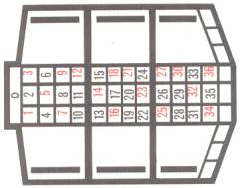
Sawdust joint: An American slang term for a non-luxury gambling club.
Settler: A British bookmaker’s expert who calculates payouts.
Shortening the odds: A bookmaker’s reduction of the odds offered for a horse in the face of heavy betting.
Show: A racing term for a horse’s finishing in third place.
Side bet: A bet made between craps players (or onlookers) on the results of a particular throw of the dice.
Sixaine (or transversale simple, or line): A roulette bet on two horizontal rows, with three numbers each, on the layout.
Six-dollar combine: An across-the-board bet in American racing.
Spinner: The persons who tosses the coins in two-up.
Splits: The persons who tosses the coins in two-up.
Stacked deck: A pack of cards that a cheat has prearranged, for his own benefit.
Starting price: The final odds offered for a horse as the race begins.
Stay: Term used to refuse extra cards from a blackjack dealer.
Straddle: In poker, the term sometimes used for the bet (twice the ante) placed by the second player before the deal.
Straight: In poker, five numerically consecutive cards of different units.
Straight flush: In poker, five numerically consecutive cards of one suit.
Stud: One of the two basic form of holdem poker . Players receive some cards face up and may not draw replacements.
Sure thing: Any bet that has very little chance of losing.
System: A method of betting (usually mathematically based)used by a player to try to get an advantage.
Three of a kind: Three cards of the same numerical value.
Ticketer: A forger of bookmaker’s tickets.
Tic-tac: The code of hand signals by which, in British racing, bookmakers’ employees relay information on current odds and betting around the course.
Tiercé: A French combination bet. The bettor predicts the horses that will finish first, second , and third.
Tipster (or tout): A person who sells to bettors his estimate of likely winners of a race (sometimes of a lottery).
Totalizator (or tote): The computer that records the amount of money bet on races in pari-mutuel betting, and that calculates the size of payouts on winners.
Tote board: A race-track information board that displays approximate odds, betting totals, payout prices, and other information necessary to the bettor.
Transversale plain (or street): A roulette bet on a horizontal row (on the layout) of three numbers.
Trick: Four cards, one from each player’s hand, put down in one round of play in games like whist and bridge.
Trump: In games like whist or bridge, a suit that is given (by prearrangement) a higher value than any other.
Turf accountant: A British euphemism for a bookmaker.
Two pairs: Two cards of one value and two of another (in poker).
Welsh: To fail to pay a gambling bet.
Wheeling (or locking): An American racing system devised for the daily double bet. The bettor backs one horse in the first race and every horse in the second.
Wild cards: Cards games that can be substituted (by prearrangement) for any other card.
